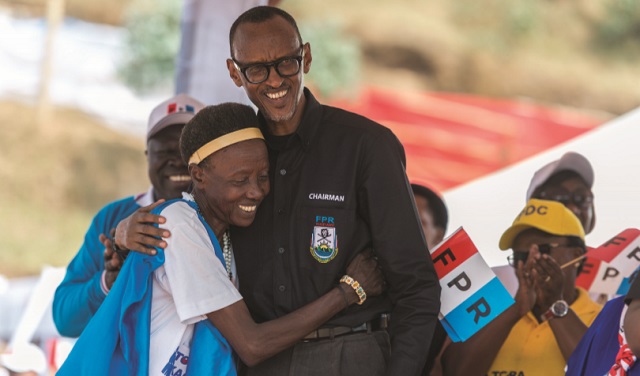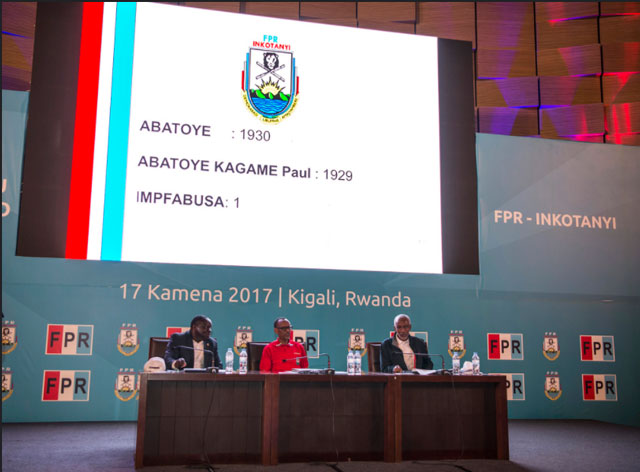
Local effort v western mimicry
The 2017 presidential election in Rwanda has been a contest between local creative effort to manage a complex post genocide situation and attempts by Western human rights groups and media to force the country to mimic the West. This contest between local creativity and an enforced mimicry was not a choice Rwandans made but one that was imposed upon them by those who think the country should follow a path decided for it from Washington, London, and Paris. The result has been a nationwide revolt against foreign pressure that forced nearly all political parties and citizens around the candidature of Paul Kagame.
Rwanda is going through a process of social change that no country has gone through in contemporary human history. It is a country where only 23 years ago, its people turned on each other with a vengeance unknown to man before. The genocide in Rwanda is unique in the annals of human history because, although it was organised by the state, it was ordinary citizens who actually carried it out. Husbands killed their wives, mothers killed their children, and friend killed friend and neighbour turned against neighbour in horror killings almost impossible to comprehend. The result was not just destruction of physical property but of the soul of its people.
In their hour of national disaster, the world abandoned Rwandans to their fate. It was a tragic failure of the international community but equally the greatest gift to that country. For then, Rwandans rose to the occasion and ended the genocide on their own. This gave them confidence to shape their destiny on their own terms. But the genocide also demonstrated the danger Rwanda faces: that although Rwandans share a common history, language, culture and religion (it is over 90% Roman Catholic), their country is a tinderbox waiting to explode. Hence nothing can be taken for granted.
It seemed impossible to reconstitute Rwandan society and get people who had killed each other to live together again. Yet through an expression of unbelievable human forgiveness, Rwandans are making strenuous efforts to put the past behind them and build a new future for their country with the milk of human kindness. At the heart of reconstructing post genocide Rwanda has been Kagame. His efforts to reconcile individuals, families and groups that had killed each other make Nelson Mandela’s reconciliation efforts in South Africa look like a walk in the park.
At the heart of reconstructing post genocide Rwanda has been Kagame. His efforts to reconcile individuals, families and groups that had killed each other make Nelson Mandela’s reconciliation efforts in South Africa look like a walk in the park.
I know Mandela has been lionised in the world imagination and rightly so. However, his efforts pale in significance when put side by side with what Kagame has done in Rwanda. One finds in president’s office a deputy chief of staff to the president whose mother is on life imprisonment for genocide. Then in the First Lady’s office, her executive secretary is a daughter of the president of Rwanda during the genocide. In cabinet, ministers whose families were exterminated sit with ministers who have been accused of killing them. It is an experiment almost impossible to comprehend.
It is this context that Rwandans have come to look at Kagame as a symbol of their miraculous recovery from social disintegration to a stable, integrated society where killer and victim live side by side in the same villages, sit in the same parliament and cabinet, some even sharing homes and a few have inter-married. It is very difficult for outsiders to appreciate what this miracle means for Rwandans.
For many citizens of this country, the success is so precious they do not want any change in the current status quo. This is most especially when it comes to the man who more than anyone else represents this miracle. For many ordinary Rwandans, the mention that Kagame is going to retire ignites a resistance I have not witnessed anywhere in my entire life. Even he has to speak of his retirement in measured tones because people simply do not want to hear it.

Reacting to outside enemy
Contrary to the belief that Kagame wants to cling to power, the Rwandan president today finds himself a hostage of his success. Each time he has tried to explain his concept of change, he has ignited anxiety and met resistance. Rwandans get agitated because they are unsure what change can bring. In his acceptance speech this July, he made this point very clear – that there is need to work towards a transition from him to another leader. He did not attract any applause but instead dampened the mood.
The anxiety the majority of Rwandans feel about Kagame’s retirement is understandable. In politics, as in the military, there is the concept called “the margin or error.” It refers to the space a country or polity has to make mistakes. When a small mistake can lead to catastrophic consequences, a country, or a people become hypersensitive. Having lived through it, Rwandans know all too well the dangers adversarial political competition can bring to a country. They know where their country has come from. They can see where it is going. They do not want to go back to that past. And they are very optimistic about their future. They also know which persons and factors have made their current progress possible. These facts have shaped how they react to their reality.
Thus in 2015, there was a massive movement in the country to change the constitution and remove term limits so that Kagame can run again. Term limits had been put in the constitution out of the desire to uphold some governance ideal borrowed from the innovation in other countries. But it did not reflect the actual desires of the Rwandan people. That is why when it came to respect them, the population revolted. Ironically, the man most accused of masterminding lifting term limits, Kagame, was resolutely against it. He was literally forced to accept to run again.
In fact, it was Kagame’s personal belief in term limits (and in popular deference to him) that the constitutional amendment did not abolish term limits. Instead, they only postponed his exit but retained the term limits. Otherwise the vast majority of Rwandans, ordinary people and as well as elites, think term limits are too much ado over nothing. However, while Rwandans want their president to stay, international (actually read Western) groups and media have been drumming up opposition to it.
 The Independent Uganda: You get the Truth we Pay the Price
The Independent Uganda: You get the Truth we Pay the Price




First of all, it shows me that you take an idea and run with it without any research whatsoever.
Rwanda under One ruling party systems across 3 Republics, has always held elections with such margins which makes Kagame no different from any other of the dictators:
1965 : MDR-Parmehutu 100% of Votes
1969 : MDR-Parmehutu 100% of Votes
1978: MRND – 98.99% (Sounds Familiar ?)
1983: MRND – 99.97% (HA! )
1988: MRND – 99.98% (LOL)
2003: RPF-INKOTANYI – 95.0 %
2010: RPF-INKOTANYI – 93.08 %
2017:RPF -INKOTANYI – 98.80% (Absolute Circus)
The irony of all this is that we say “today it’s different”. In which way? One dictator who stifles any critics and gets elected with absolute power! Liberation???? More like Going back 50% !
Convenient that all the opposition is intimidated, jailed or killed.
I don’t know who you are but you don’t know Rwanda.In Rwanda there is real democracy.Who is among candidates who claim intimidation during their campaings.Again our diaspora showd that there is no fear because they vote H.E Paul KAGAME more 90 %
OMG, LOL – you claim there’s “Democracy” in Rwanda, with the 99% victoryt margin?? When the time bomb bursts just contain the heat and you and your countrymen don’t run to Uganda to seek refuge!
I wonder how young people listen to the nonsense from those who committed genocide against tutsi in Rwanda and then you grow up with hatred. Rwanda is free country people do what the want anytime they want, Kagame Paul is not only a president of Rwanda he is also a hero to the Rwandans. For records he did impossible! !
REMEMBER, 1965 – 2017 ALL THOSE ALSO HAD THEIR TRUMPET BLOWERS, A. MWENDA INCLUSIVE
You areally comparing MDR you know nothing you who is saying he didn’t do his research. You’re biased MRND organizes genocide, refused it’s residence to come back instead killed them. And you dare comparing them the democracy of that time is way to different with today stop smelling what you don’t see.
But Kagame also kills his opponents even where they have sought refuge!!!!!!!!!
i believe this article is simply indicating that people need to decipher facts from unfounded rhetoric. Like coming to Rwanda and finding out how it feels to be a Rwandan before you draw conclusions. But if you decide to remain in another location and decide to read news, then look for statistics by international bodies on economic development indicators, security and other positives. Draw a comparison before you make a half baked conclusion. you will find out that these indicators are pointing to the fact that Rwandans enjoying themselves.
Anyway, as a Rwandan i know the positives far outweigh the negatives and the together we shall overcome those since we are united towards a bigger vision coupled with the fact that the Government of Rwanda reflects the best in her people.
hhh, Mwenda as you said did USA lead by tyrant? Rwanda knows the re-election of baba wa taifa
An interesting article@Andrew Mwenda..u deserve to be a Rwandan.please have ure second citizenship as a Rwandan.u hv really liked Rwanda and her Natives.we love Andy?
Andrew Mwenda is on H.E. Kagame’s payroll for External populist propaganda. H.E. YKM has also hired his services after realising that he was a bitter critic of his regime, he is now a Saul turned Paul.
you who are comparing MRND TO RPF , your research is biased, remember when MRND was the ruling party there was a unique candidate, therefore ,there is no way he couldn’t get 100% of votes, don’t compare that to post genocide elections
The win margin by kagame of 99% only reflects how the people of rwanda have follen short of the reality.they have accepted to swallow the pill and lie down